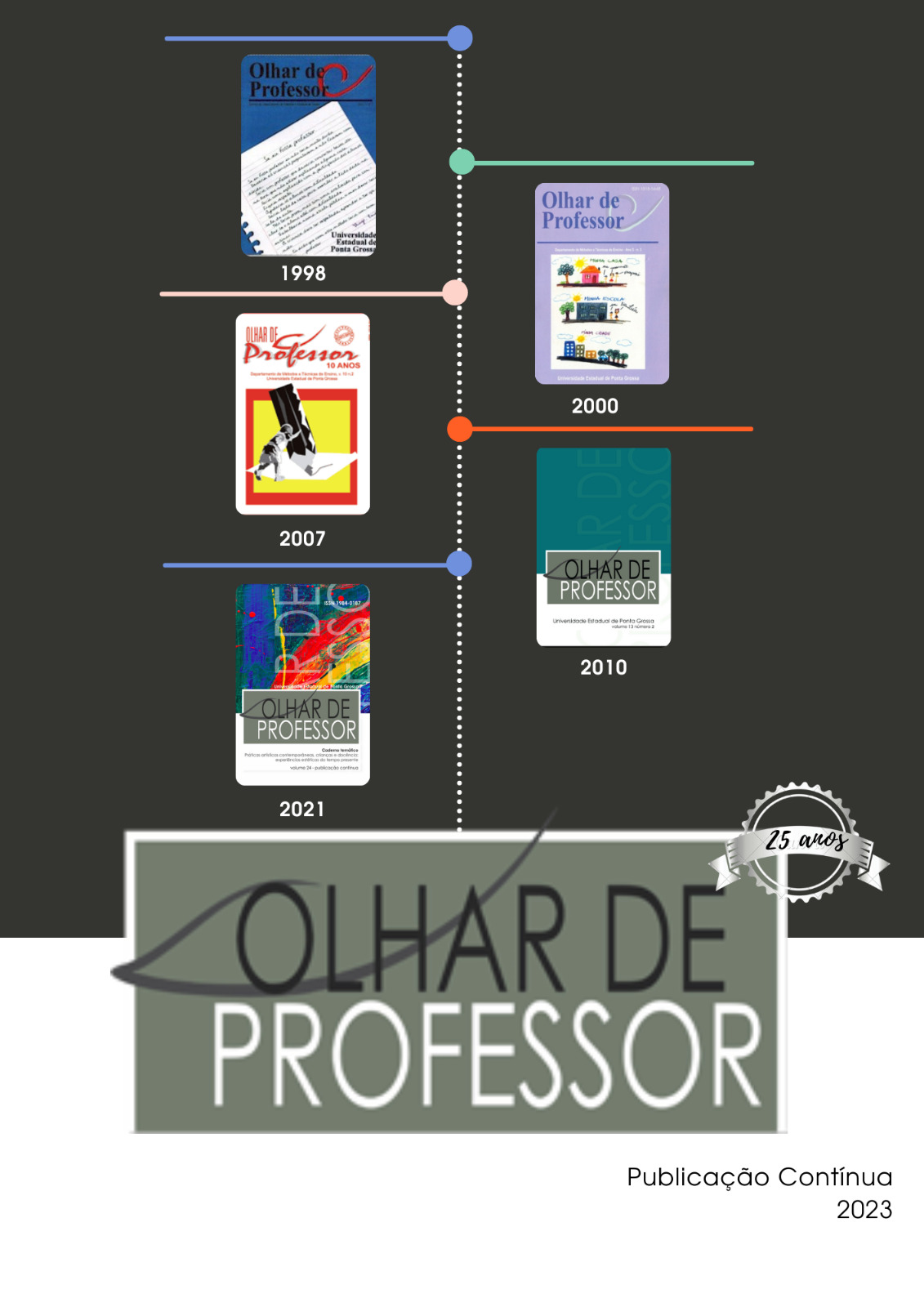Afinal para que serve a Educação Infantil?
Conteúdo do artigo principal
Resumo
Este artigo em comemoração aos 25 anos da Revista Olhar de Professor retoma parte do artigo “Educação infantil e a escola fundamental de 9 anos”, publicado nesta revista em 2009, a fim de debater o que ocorreu na Educação Infantil nesses últimos 14 anos. Buscamos analisar algumas políticas públicas implementadas, bem como avanços e retrocessos em relação à educação das crianças em creches e pré-escolas. Apontamos problemas contemporâneos da Educação Infantil, buscando mostrar a maneira pela qual a criança vem sendo capturada por saberes e poderes atribuindo-lhe uma essência e despolitizando a educação infantil. Ao final do artigo, buscamos responder à questão: Afinal para que serve a Educação Infantil?
Downloads
Detalhes do artigo

Este trabalho está licenciado sob uma licença Creative Commons Attribution 4.0 International License.
Autores que publicam nesta revista concordam com os seguintes termos:
a) Os autores mantêm os direitos autorais e concedem à revista o direito de primeira publicação, com o trabalho simultaneamente licenciado sob a Creative Commons Attribution License Atribuição 4.0 Internacional (CC BY 4.0) que permite o compartilhamento do trabalho com reconhecimento da sua autoria e publicação inicial nesta revista.
b) Os autores são autorizados a assinarem contratos adicionais, separadamente, para distribuição não exclusiva da versão publicada nesta revista (por exemplo, em repositórios institucionais ou capítulos de livros), com reconhecimento da sua autoria e publicação inicial nesta revista).
c) Os autores são estimulados a publicar e distribuir a versão onlline do artigo (por exemplo, em repositórios institucionais ou em sua página pessoal), considerando que isso pode gerar alterações produtivas, bem como aumentar o impacto e as citações do artigo publicado.
d) Esta revista proporciona acesso público a todo o seu conteúdo, uma vez que isso permite uma maior visibilidade e alcance dos artigos e resenhas publicados. Para maiores informações sobre esta abordagem, visite Public Knowledge Project, projeto que desenvolveu este sistema para melhorar a qualidade acadêmica e pública da pesquisa, distribuindo o OJS assim como outros softwares de apoio ao sistema de publicação de acesso público a fontes acadêmicas.
e) Os nomes e endereços de e-mail neste site serão usados exclusivamente para os propósitos da revista, não estando disponíveis para outros fins.
______________

Este obra está licenciado com uma Licença Creative Commons Atribuição 4.0 Internacional.
Referências
ABRAMOWICZ, A. EDUCAÇÃO INFANTIL E A ESCOLA FUNDAMENTAL DE 9 ANOS. Olhar de Professor, [S. l.], v. 9, n. 2, 2009. Disponível em: https://revistas.uepg.br/index.php/olhardeprofessor/article/view/1467. Acesso em: 7 dez. 2023.
ABRAMOWICZ, A. crianças e guerra: as balas perdidas!. childhood & philosophy, [S. l.], v. 16, n. 36, p. 01–14, 2020. DOI: 10.12957/childphilo.2020.48358. Disponível em: https://www.e-publicacoes.uerj.br/childhood/article/view/48358. Acesso em: 7 dez. 2023.
ADORNO, T. W. Educação e emancipação. Rio de Janeiro/São Paulo, Paz e Terra, 1995.
BENJAMIN, W. Magia e técnica, arte e política. São Paulo: Brasiliense, 1987.
BRANDÃO, J. S. Mitologia grega. Petrópolis: Vozes, 1991.
BRASIL. Estatuto da Criança e do Adolescente: Lei federal nº 8069, de 13 de julho de 1990. Rio de Janeiro: Imprensa Oficial, 2002. BRASIL.
BRASIL. Lei nº 10.639, de 9 de janeiro de 2003. Altera a lei nº 9.394, de 20 de dezembro de 1996, que estabelece as diretrizes e bases da educação nacional, para incluir no currículo oficial da rede de ensino a obrigatoriedade da temática “História e Cultura Afro-brasileira”, e dá outras providências. Disponível em: Disponível em: http://www.planalto.gov.br/ccivil_03/leis/2003/l10.639.htm Acesso em: 05 nov. 2023.
http://www.planalto.gov.br/ccivil_03/leis/2003/l10.639.htm
BRASIL. Lei n. 11.645/2008, de 10 de março de 2008. Altera a lei n. 9.394, de 20 de dezembro de 1996, modificada pela lei n. 10.639, de 9 de janeiro de 2003, que estabelece as diretrizes e bases da educação nacional, para incluir no currículo oficial da rede de ensino a obrigatoriedade da temática “História e Cultura Afro-Brasileira e Indígena”. Diário Oficial da União, Brasília, DF, 11 mar. 2008.
DELIGNY, F. Oeuvres. L`Arachnéen: Paris, 2017.
FERREIRA, E. B. Crianças negras e cotidiano jurídico na Ribeirão Preto do final dos Oitocentos. Tese (Doutorado em Educação) – Universidade Federal de São Carlos, São Carlos, 2019.
JAPIASSU, H. As paixões da ciência: estudos de história das ciências. São Paulo: Editora Letras e Letras, 1991.
Kramer, S. Contribuições de Martin Buber para a reflexão sobre/do homem contemporâneo". In: Kramer, S. Educação como resposta responsável: conhecer, acolher, agir. Campinas, Papirus Editora, 2021, p. 129-138.
Kramer, S. "Porque Narciso acha feio o que não é espelho" - Necessidades, desafios e conflitos na pesquisa com crianças. In: Kramer, S. (org) Retratos de um desafio: crianças e adultos na educação infantil. São Paulo. Editora Atica, 2009, p. 36-47).
ROSEMBERG, F. Sísifo e a educação infantil brasileira. Pro-Posições, Campinas, v. 14, n. 1 (40), p.177-194, jan./abr. 2003. Disponível em: < Disponível em: https://periodicos.sbu.unicamp.br/ojs/index.php/proposic/article/view/8643915. Acesso em: 22 nov.2023.





